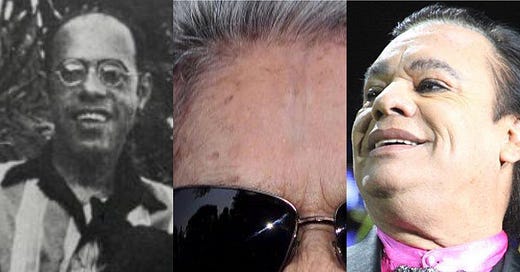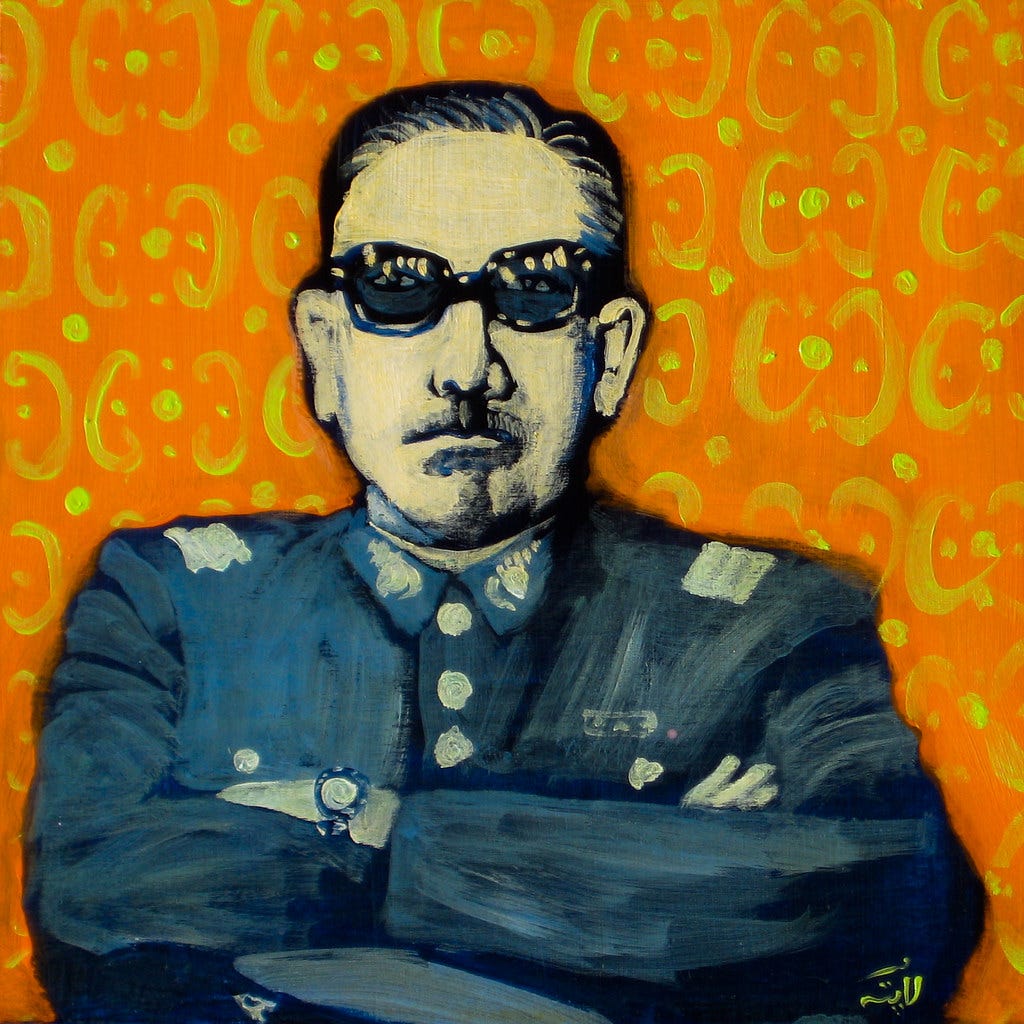A few weeks ago, I wrote about Honor Moore and her new book about feminism. And the responses I got were surprising. Several people used the same word: “Courageous.”
What was surprising about this is that the people who said this were Americans.
The reason that this was surprising is that whenever I’ve been called courageous in the past it was almost always by Latin Americans. And it’s often been about my writing, about stuff that didn’t seem courageous. In praising Honor, it never crossed my mind that I was doing anything bold—but then I have very rarely heard that word about anything I said knowing I was taking a risk. I’ve been called courageous for having a negative opinion about someone who is obviously terrible, or for describing as gay someone who is obviously gay.
(Mário de Andrade, Chavela Vargas, even … Juan Gabriel.)
Every time, the word surprised me.
So why is it new—and worrying—that Americans are using it?
As an American who grew up close to the Mexican border, I have always been intrigued by the differences between Americans and Latin Americans. And as an American who writes, at least in part, for a Latin American audience, I have become fascinated over the years by the differences in response to my work in different cultures. These differences are far more subtle than I thought they were growing up, when I might have thought of Latin Americans as people who looked different, or ate different food, or spoke a different language. As I got to know Latin America over the years, those differences have faded, at least in my mind. And I have come to see the biggest difference might be the difference in what you say and how you say it.
I can say with confidence that Americans love to be interviewed. There’s no “drawing out” a New Yorker. (The art is usually wrapping things up within four or five hours.) Latin Americans, on the other hand, are often warmer, more welcoming—but far more guarded, and tell you less. As an interviewer, you have to work harder.
Over the years, I have learned why this is. A few years ago, I was involved in a controversy about biographies in Brazil, which taught me about how and why biographies don’t get written, even of extremely consequential figures. When Americans think of Latin American censorship, they might think of a guy like this sitting next to the printing press, slashing articles out of the newspaper, or ordering degenerate artists shipped off to a remote work camp for “reeducation.” But was not the presence of legal censorship that kept journalists and writers from writing things that need to be written.
That might have been true during the mercifully expired dictatorships, but even then censorship worked much more subtly, and much more effectively. Writers who were punished were only rarely getting fired or sued or arrested. You might instead find yourself assigned to a different desk at the newspaper, or notice that your emails weren’t being returned quite as promptly as they were. Years later, you might find out what you’d done, but by then it was too late. Your once-promising career had been left to rot.
And so there emerged a general nervousness about offending. You learned not to rock the boat. Even once there was a democratically elected leader in the presidential palace, there was still a dictator living rent-free inside your head. He insisted that you look carefully at every word you wrote, maybe toning down that overly fluourescent adjective, maybe putting a “maybe” in front of any blunt statement. There were enough examples all around you to make sure that you turned over every word you wrote.
This is the climate that has now emerged in the United States. But as with most things in the United States, it has happened far less subtly than it has in Latin America. Every single day, it seems, a career is ruined over some ancient pecadillo: something you tweeted as a teenager, some story someone you’ve never met has decided to “share.” Sometimes the accusation is so ludicrous that it hardly merits response: Is Andrew Yang anti-Asian? Are Glenn Greenwald or Andrew Sullivan anti-LGBT? It is not an exaggeration to say that every writer I know has faced this situation.
I’ve italicized that, but let me put it in bold, too: every writer I know.
Most of the time, you hardly dignify these accusations. You know that another monster will come slithering out of the internet soon enough. You know that there’s a kind of herd immunity—that, as one ridiculous story after the next tumbles through the intertubes, more and more people roll their eyes.
You ignore it, but it has an effect. People grow timid, cautious. In recent days, friends have confided that they’re worried that something they wrote years ago might be dredged up, misinterpreted, and wielded against them. Or that, in college, they hooked up with someone when drunk (!). This kind of self-examination takes up more and more space in your head, makes it harder and harder to write.
Historically, the best thing about the United States has probably been a freedom of speech that, over the centuries, has exceeded any other country’s. It’s never been absolute. Lawyers comb my books and everyone else’s. I’ve often had to remove things that could have exposed me to liability. Still, the US has been much more free than other similar countries—Britain, for example, with its much more restrictive laws. Not to mention countries with a history of dictatorship.
But now we’ve reached the point where Americans consider an article about Honor Moore “courageous.” Don’t get me wrong. I love being thought of as courageous. But that article wasn’t courageous; it was a piece about a widely respected writer I admire. Still, when people praise my courage, I start to wonder: did I do something brave here, like writing about a feminist writer while not a woman myself? (This is probably it.)
The other day, I was listening to one of my favorite podcasts, Aufhebunga Bunga. (I’ve been on it, too: you can listen here.) The author being interviewed, Catherine Liu, was saying that her new book, Virtue Hoarders, is designed to be provocative. (I haven’t read it, so this retweet does not equal an endorsement, but I liked her on the podcast.) She said that despite the appearance of stormy controversy around just about everything, there is in fact no real controversy anymore, that people are too scared to have contrary opinions or to engage in real debate.
That, to me, sounded exactly like Latin America. There are a lot of hot takes there, and a lot of people yelling at each other on Twitter, and a lot of bitchiness and backstabbing—but there’s far fewer substantive critiques. In so many corners of academia and journalism, you find a remarkable conformity that stultifies every aspect of political and intellectual life.
In the last few years, many Americans felt called to “resist.” At a time when the country seems like a vast sinking Titanic, people have mulled over their patriotic duty, and the upsurge in activism during the early Trump years was inspiring.
(Before becoming, like so many other phenomena in American life, cringeworthy and stupid.)
If we want to honor the best part of our moral and intellectual heritage, we have to find the courage not to be courageous. Not to let ourselves be bullied into self-censorship, but instead to confide in the good sense of our readers and to say, clearly and respectfully, exactly what we mean.
Your comments and support have been a boon: thank you. And thank you to all of you who have subscribed to this free newsletter. The more of you who take out a paid subscription, the longer I can keep it free.
And if you want to share this post, click here:
Aaaaaand if you haven’t heard enough from me this week, check out this interview I did over the weekend with Magic City Books.





A couple of thoughts, Ben:
1) “ Every single day, it seems, a career is ruined over some ancient pecadillo: something you tweeted as a teenager, some story someone you’ve never met has decided to “share.” To this I say, simply, that some rehabilitations for “ancient peccadillos” are neither deserved nor “ancient” — see “Mark Halperin.”
2) “...despite the appearance of stormy controversy around just about everything, there is in fact no real controversy anymore, that people are too scared to have contrary opinions or to engage in real debate“ Yes! Though more pedestrian/quotidian/low-import than perhaps what you had in mind, I couldn’t help but think of the change in how PBS’ Newshour takes on discussions of issues today (one POV one evening, maybe another voice on another evening) compared to how MacNeil or Lehrer (go Texas!) would gather up the spectrum and dive into (polite) verbal combat.
3) I am genuinely enjoying getting to know your thinking here on Substack and work (I am relearning how to read — s.t. the pandemic stole from me!!). Do thank your sister; her piece in the New Yorker this week ensnared me dans la famille Moser. Our family twists / turns are strikingly familiar.